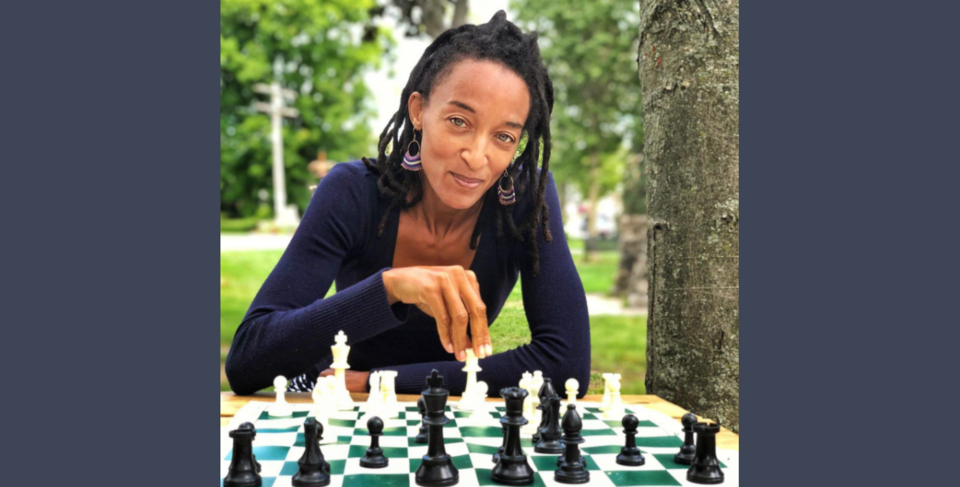Ingrid Gayle didn’t grow up playing chess like many chess players you may meet.
Dominoes was always on the table in her West Indian household. Checkers, Battleship and Monopoly sure, but chess was not on her radar.
In 2015, when Gayle, the founder of global online school Girl Boss Chess, started home-schooling her then five-year-old daughter, a friend mailed her a chess set and guide.
The two dove in and learned the game together.
“I loved the benefits that she was receiving; I loved the quality time that we were spending together,” Gayle remembers. Her younger daughter has since learned too and it’s become a family affair. “I don’t think we’ll ever stop playing,” she said.
Gayle, who is based in Gananoque, Ont., has been teaching chess to kids for five years now, and after seeing up close how men and boys dominated the game, she decided to carve out a space for women.
Girl Boss Chess aims to offer a space for girls, women and nonbinary people to learn chess and improve their skills in an empowering space, to help up gender diversity in the sport.
“You’ll have parents who have boys and girls in the same household, and the boys are playing chess and the girls are not,” Gayle came to notice in her classes. She asked a few parents why that was, and their response was they didn’t know — they just hadn’t asked their daughters if they wanted to try it.
“I want all girls to just experience it. And let the girls decide.” To help with that, Girl Boss Chess has a free 30-minute intro class so first-timers can get their feet wet.
The online school started running pilot classes toward the end of last year and officially launched in early January. With students as young as four years old, Girl Boss Chess makes sure that the classes are not boring. All of the instructors, Gayle said, are very animated, and she decided to teach the fundamental classes herself to make sure the kids get excited about the game and learn about the rules and pieces through stories.
When women and parents started to show interest, Girl Boss added a “queens” class for adults who’d like to learn as well.
Chess is known to improve reading, math, strategy and problem solving skills and Gayle remarked that it’s incredible how focused a five, six or seven-year-old can be when they’re concentrated on a game. It also teaches them that their actions have consequences when a hasty move means they lose a knight, she said. Most important, she said, is the way their confidence grows when they get more comfortable with the game.
“Every girl deserves to have the benefits of that,” Gayle said.
There are more than 1,600 international chess grandmasters as of last year, and just 37 are women, according to the International Chess Federation (FIDE).
While men dominate the top ranks of players, a 2008 study found that it’s not necessarily that men are better at the sport, but because the pool of male players is vastly bigger than other genders, there’s a higher chance of there being more star players to fill the ranks. “The extreme values in a large sample are likely to be greater than those in a small one,” the study said.
Statistically, the gender divide in chess is still abysmal, but pop culture in recent years has brought women in chess to the screen. In 2016, Disney’s “Queen of Katwe” introduced Ugandan chess player Phiona Mutesi to a wide audience and last year, “The Queen’s Gambit,” about how a young woman became a chess prodigy, became Netflix’s biggest original limited series ever.
Girl Boss Chess also teaches classes in multiple languages — English, French, Portuguese, Italian, Spanish and Arabic — and has instructors, some of whom are masters, from all around the world — Canada, Italy, South Africa, Ghana, Brazil and France.
Instructor Rose Tuong said she appreciates how chess — which derives from chaturanga, an Indian game created in the 6th century — spans so many cultures around the world.
“You can go to a place and not necessarily speak the language or know anything about the culture, but if you find another person who you can play chess with, you can enter into this really rich, intellectual exchange with them,” Tuong said.
Tuong, who is based in Toronto, has played since grade school and has taught chess for seven years to students from junior kindergarten to high school ages.
In her experience with chess, Tuong has found it alienating to frequently see the same faces at the top of the game or even local clubs — which have been mostly those of white men lately. “I would like there to be a shift where we start looking toward the faces of other kinds of people.”
When it comes to sports like chess and industries like STEM being male-dominated, Gayle said it has more to do with exposure than ability.
“I think women thrive just as well as men,” she said, “but we don’t get the exposure or we don’t get the opportunity. That’s what it is.”
Tuong agreed, saying the barriers that exist for women in these fields are “cultural, economical and sociological,” and are not based on abilities.
“If we want to progress as a society, everybody should be wanting women to enter and thrive in these fields,” Tuong said. “If we want to maintain the status quo. What does that say about us?”
- Angelyn Francis, Toronto Star, Local Journalism Initiative
